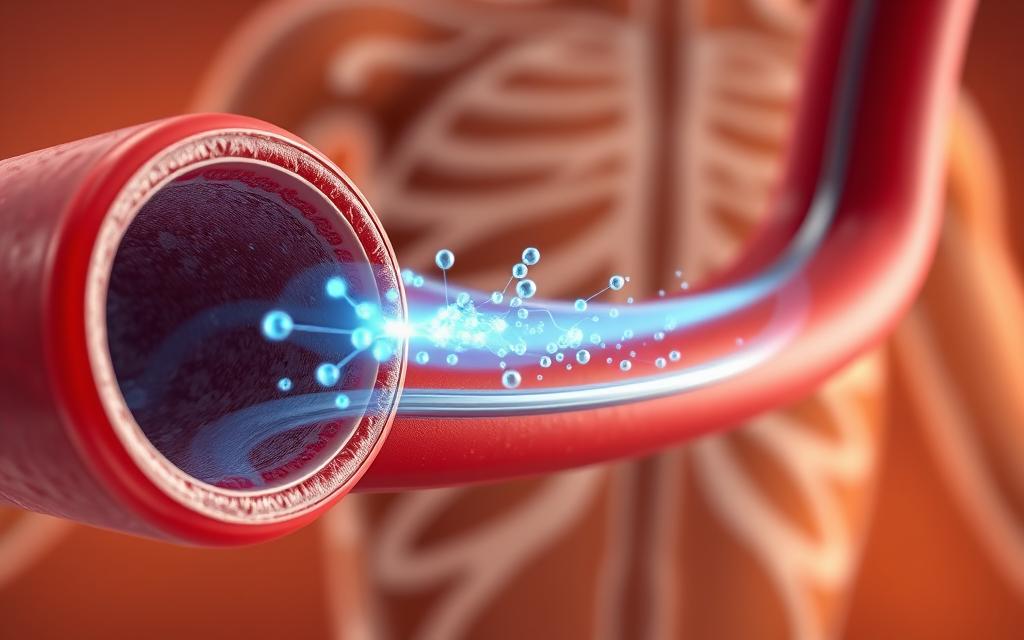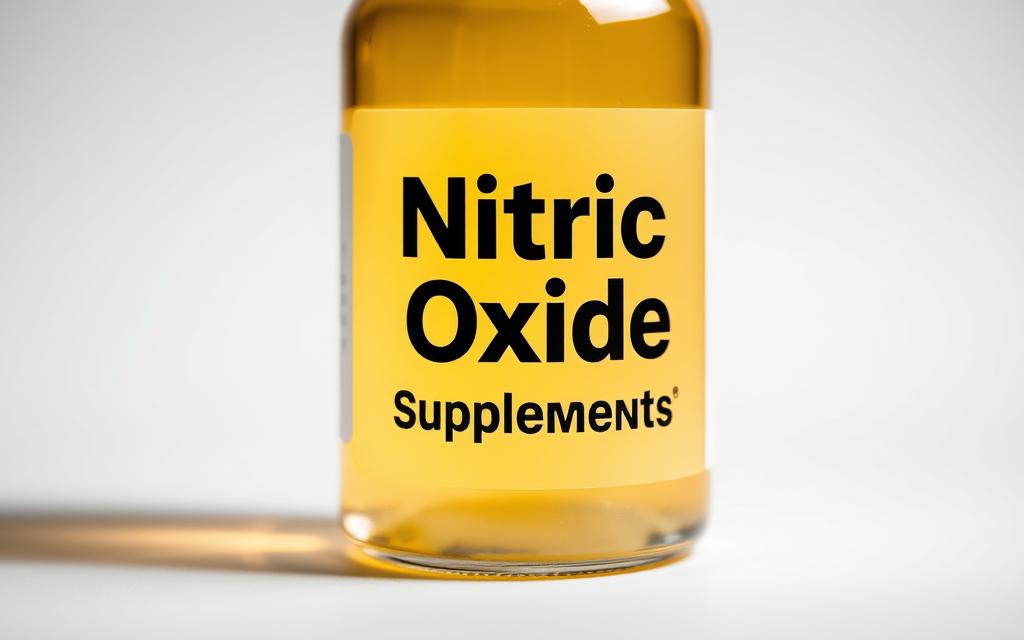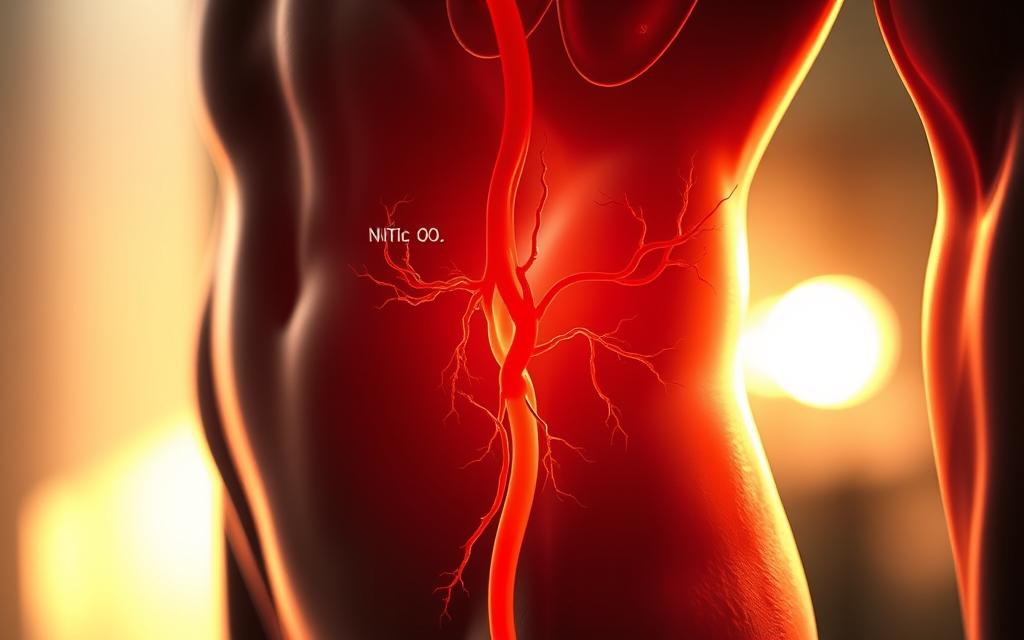How Nitric Oxide Improves Erectile Dysfunction: Benefits & Science Explained
Nitric oxide plays a significant role in maintaining healthy blood flow, which is crucial for erectile function. Understanding how nitric oxide impacts erectile health can provide insights into effective treatments for erectile dysfunction.
Nitric oxide is a molecule that helps to relax the blood vessels, improving blood flow. This process is vital for achieving and maintaining an erection. Research has shown that individuals with erectile dysfunction often have lower levels of nitric oxide.
By understanding the link between nitric oxide and erectile function, individuals can explore new avenues for treating erectile dysfunction. This knowledge can help in developing effective treatment plans that address the root causes of the condition.
Understanding Erectile Dysfunction and Its Causes
Understanding the complexities of erectile dysfunction requires a deep dive into its causes and the physiological processes that govern normal erectile function. Erectile dysfunction (ED) is a condition that affects a significant number of men, causing distress and impacting their quality of life.
The Physiology of Normal Erections
Normal erections are the result of a complex interplay between neurological signals, blood flow, and hormonal balances. When a man is sexually stimulated, the release of certain neurotransmitters triggers the relaxation of smooth muscle in the corpus cavernosum, allowing blood to flow into the penis and resulting in an erection. This process is heavily dependent on the integrity of the vascular system and the presence of adequate nitric oxide, a crucial molecule for vasodilation.
Common Physical and Psychological Causes of ED
Erectile dysfunction can stem from a variety of causes, including physical conditions such as diabetes, hypertension, and cardiovascular disease, as well as psychological factors like stress, anxiety, and depression. Lifestyle factors, including smoking and a sedentary lifestyle, can also contribute to the development of ED. For more information on how specialists can treat ED, visit Colorado Urologists.
The Critical Role of Blood Flow in Erectile Function
Blood flow plays a crucial role in achieving and maintaining an erection. Any condition that impairs blood flow, such as atherosclerosis or other vascular diseases, can lead to erectile dysfunction. Understanding the link between blood flow and erectile function is essential for diagnosing and treating ED effectively.
The Science of Nitric Oxide in Sexual Health
Understanding the science behind nitric oxide is essential for grasping its impact on erectile dysfunction. Nitric oxide is a molecule that plays a significant role in various physiological processes, including vascular health.
What Is Nitric Oxide and How It Functions in the Body
Nitric oxide is a naturally occurring molecule in the body, crucial for maintaining healthy blood flow. It is produced by the endothelium, the inner lining of blood vessels, and serves as a signaling molecule that relaxes the smooth muscle cells of blood vessels, leading to vasodilation. This process is vital for ensuring adequate blood supply to various organs, including the penis.
For more information on how to boost nitric oxide levels, you can visit Colorado Urologists for expert advice.
Nitric Oxide’s Mechanism in Vasodilation and Blood Flow
The mechanism by which nitric oxide induces vasodilation involves the activation of guanylate cyclase, an enzyme that increases the levels of cyclic guanosine monophosphate (cGMP) in smooth muscle cells. Elevated cGMP levels result in smooth muscle relaxation, allowing blood vessels to dilate and improving blood flow. This process is critical for achieving and maintaining an erection.

The Direct Connection Between Nitric Oxide and Erectile Response
The direct connection between nitric oxide and erectile response is well-established. During sexual arousal, nitric oxide is released from the nerve endings and endothelial cells in the penis. This release triggers the vasodilation cascade, leading to increased blood flow into the penile arteries and, subsequently, an erection. Therefore, nitric oxide is crucial for normal erectile function, and its deficiency is associated with erectile dysfunction.
Enhancing nitric oxide production or its signaling pathway can be a potential strategy for managing erectile dysfunction. This can be achieved through various means, including lifestyle modifications and certain supplements that support nitric oxide production.
How an Endocrinologist Can Treat Erectile Dysfunction
When facing erectile dysfunction, knowing when to consult an endocrinologist can significantly impact treatment outcomes. Erectile dysfunction (ED) is a complex condition that can stem from a variety of physical, psychological, and hormonal factors. An endocrinologist specializes in the diagnosis and treatment of hormone-related issues, making them a crucial part of the treatment team for ED, especially when hormonal imbalances are suspected.
When to Consult an Endocrinologist vs. Other Specialists
Determining whether to see an endocrinologist or another specialist can be confusing. If your ED is accompanied by symptoms like low libido, fatigue, or other signs that might indicate a hormonal imbalance, an endocrinologist is the right doctor to see. They can assess whether conditions like hypogonadism (low testosterone) or thyroid disorders are contributing to your ED.
| Specialist | Area of Expertise | Relevance to ED |
|---|---|---|
| Endocrinologist | Hormone disorders, including thyroid and testosterone issues | ED related to hormonal imbalances |
| Urologist | Urinary tract and male reproductive system issues | ED from urological conditions |
| Primary Care Physician | General health, initial assessment of ED | Initial evaluation and referral |
Diagnostic Approaches: Hormone Testing and Evaluation
An endocrinologist will typically start with a thorough medical history and physical examination. They may then order hormone tests to check levels of testosterone, thyroid hormones, and other relevant hormones. These tests can help identify hormonal imbalances that could be contributing to ED.
Hormone testing is a critical diagnostic tool. It usually involves blood tests, and sometimes additional tests like saliva or urine tests, depending on the suspected hormonal issue.
Endocrinologist-Directed Treatment Plans for ED
Once a diagnosis is made, an endocrinologist can develop a treatment plan. This might include hormone replacement therapy if there’s a significant hormonal deficiency, adjustments to existing medications that could be causing ED, or recommendations for lifestyle changes that can improve hormonal balance and overall health.
Treatment plans are highly individualized, taking into account the patient’s overall health, the underlying cause of their ED, and their personal preferences.
Key Benefits of Nitric Oxide for Erectile Dysfunction
Nitric oxide has emerged as a crucial element in addressing erectile dysfunction, offering several benefits that improve overall sexual health. Its role in vasodilation and enhancing blood flow makes it a significant factor in treating erectile dysfunction.
Improved Blood Flow and Erectile Quality
Nitric oxide supplements can significantly improve blood flow, which is essential for achieving and maintaining an erection. By enhancing vasodilation, nitric oxide ensures that the penile arteries receive adequate blood supply, leading to improved erectile quality. Increased blood flow not only aids in achieving firmer erections but also supports overall penile health.

Enhanced Response to Sexual Stimulation
The presence of nitric oxide enhances the body’s natural response to sexual stimulation. By facilitating the relaxation of smooth muscle and increasing blood flow, nitric oxide enables a more robust erectile response. This means that individuals can experience improved sexual function and a more satisfying sexual experience.
Potential Long-Term Vascular Health Benefits
Beyond its immediate benefits for erectile dysfunction, nitric oxide may also contribute to long-term vascular health. Regular supplementation or enhancement of nitric oxide levels can lead to improved overall cardiovascular health, reducing the risk of various vascular-related conditions. This long-term benefit underscores the potential of nitric oxide therapy as a holistic approach to men’s health.
In conclusion, the benefits of nitric oxide for erectile dysfunction are multifaceted, ranging from improved blood flow and erectile quality to enhanced response to sexual stimulation and potential long-term vascular health benefits. By understanding these advantages, individuals can make informed decisions about incorporating nitric oxide into their treatment plans.
Nitric Oxide-Based Treatments and Therapies
Nitric oxide-based treatments have revolutionized the approach to erectile dysfunction, offering new hope to those affected. The science behind nitric oxide’s role in vascular health has led to the development of various therapies targeting this pathway.
Prescription Medications That Target the Nitric Oxide Pathway
Prescription medications such as PDE5 inhibitors (e.g., sildenafil, tadalafil) work by enhancing the effects of nitric oxide in the body, promoting vasodilation and improving blood flow to the penis. These medications have become a cornerstone in the treatment of erectile dysfunction.
Key Benefits: Improved erectile function, increased confidence, and enhanced quality of life.
Supplements and Natural Approaches to Boost Nitric Oxide
In addition to prescription medications, certain supplements and natural approaches can help boost nitric oxide levels. These include dietary changes, such as consuming foods rich in nitrates (e.g., leafy greens, beets), and supplements like L-arginine and L-citrulline.
- L-arginine: An amino acid that serves as a precursor to nitric oxide.
- L-citrulline: Helps increase L-arginine levels and improve nitric oxide production.
- Dietary nitrates: Found in vegetables, these can be converted into nitric oxide in the body.
Lifestyle Modifications That Enhance Nitric Oxide Production
Lifestyle changes can significantly impact nitric oxide production. Regular exercise, maintaining a healthy weight, quitting smoking, and managing stress can all contribute to improved nitric oxide levels and overall vascular health.
| Lifestyle Modification | Impact on Nitric Oxide |
|---|---|
| Regular Exercise | Improves cardiovascular health, enhancing nitric oxide production. |
| Healthy Diet | Increases intake of nitrates and other nutrients that support nitric oxide production. |
| Stress Management | Reduces oxidative stress, preserving nitric oxide levels. |
By incorporating these treatments and therapies into their lifestyle, individuals with erectile dysfunction can experience significant improvements in their condition.
Conclusion: Making Informed Decisions About Nitric Oxide Therapies
Nitric oxide therapy has emerged as a promising approach to treating erectile dysfunction, backed by a strong scientific foundation. By understanding how nitric oxide functions in the body and its role in vasodilation and blood flow, individuals can make informed decisions about their treatment options.
The benefits of nitric oxide therapy, including improved blood flow and erectile quality, make it an attractive option for those seeking to address erectile dysfunction. As discussed, various treatments and therapies target the nitric oxide pathway, offering a range of choices for individuals to explore.
When considering erectile dysfunction treatment options, it’s essential to consult with a healthcare professional, such as an endocrinologist, to determine the best course of treatment. By doing so, individuals can ensure they’re making informed decisions about their health and potentially benefiting from nitric oxide therapies.
